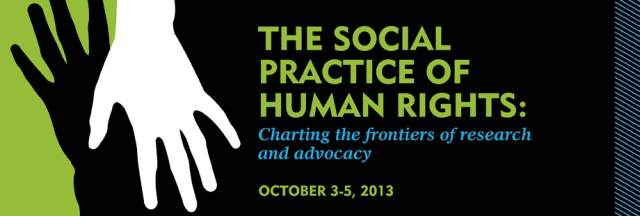Paper/Proposal Title
Choosing Rights: The Puzzle of the Rights Frame in HIV Advocacy
Location
River Campus Room M2060
Start Date
10-4-2013 9:30 AM
End Date
10-4-2013 11:15 AM
Abstract
HIV advocates are at the vanguard of the expansion of human rights-based advocacy into the health sector. Departing from more traditional frames of development and public health, HIV activists often frame their claims as human rights even in national settings where rights language is perceived as unusual or foreign. Why do groups choose to frame their claims as rights and how do they understand the impact of this choice? Using a comparative case-study approach, this paper examines 9 civil society organizations (in Ghana, Uganda, South Africa and Botswana) conducting advocacy on HIV in sub-Saharan Africa with varying use of rights, drawing on 145 semistructured interviews, naturalistic observation, and document analysis. This research indicates the most significant motivator for and perceived impact of rights is at the individual level where rights are seen as having a profound impact on the identity and behaviour of constituents enabling them to seek and claim services from a position of strength and entitlement. HIV activists who employ rights credit them with transforming the relationship between individuals and the state, increasing access to health services and improving the quality of care.
Choosing Rights: The Puzzle of the Rights Frame in HIV Advocacy
River Campus Room M2060
HIV advocates are at the vanguard of the expansion of human rights-based advocacy into the health sector. Departing from more traditional frames of development and public health, HIV activists often frame their claims as human rights even in national settings where rights language is perceived as unusual or foreign. Why do groups choose to frame their claims as rights and how do they understand the impact of this choice? Using a comparative case-study approach, this paper examines 9 civil society organizations (in Ghana, Uganda, South Africa and Botswana) conducting advocacy on HIV in sub-Saharan Africa with varying use of rights, drawing on 145 semistructured interviews, naturalistic observation, and document analysis. This research indicates the most significant motivator for and perceived impact of rights is at the individual level where rights are seen as having a profound impact on the identity and behaviour of constituents enabling them to seek and claim services from a position of strength and entitlement. HIV activists who employ rights credit them with transforming the relationship between individuals and the state, increasing access to health services and improving the quality of care.




Comments
This biennial conference provides a unique space for scholars, practitioners and advocates to engage in collaboration, dialogue and critical analysis of human rights advocacy — locally and globally. Learn more about the Human Rights Center at the University of Dayton >>>.